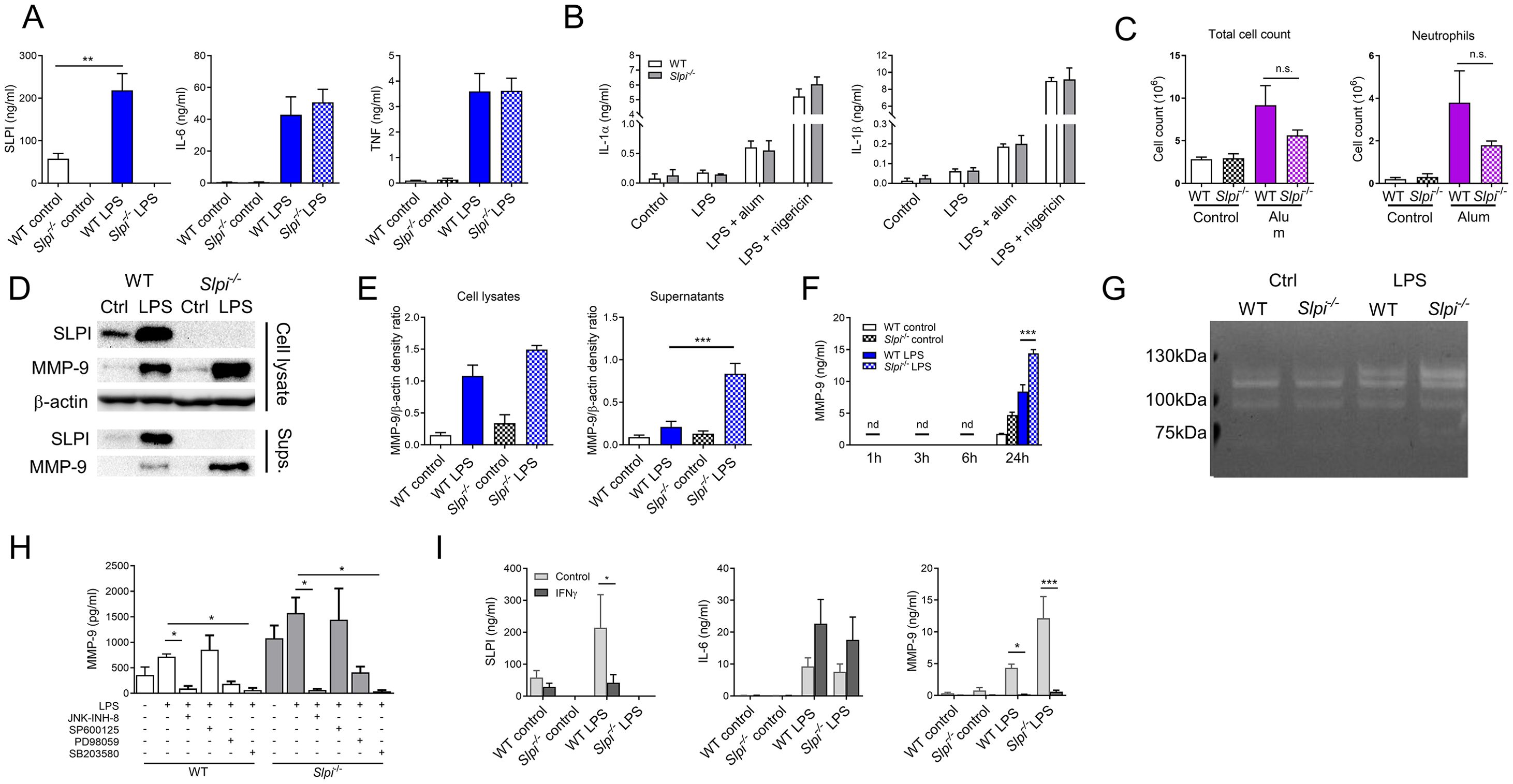- 1Department of Immunology, Faculty of Biochemistry, Biophysics, and Biotechnology, Jagiellonian University, Kraków, Poland
- 2Doctoral School of Exact and Natural Sciences, Jagiellonian University, Kraków, Poland
A Correction on
Endogenous SLPI contributes to the regulation of inflammatory responses in peritoneal macrophages by modulating MMP-9 production
By Tyshchenko M, Pocałuń N, Kwiecińska P, Cichy J, Wilk MM and Oleszycka E (2025) Front. Immunol. 16:1563845. doi: 10.3389/fimmu.2025.1563845
There was a mistake in Figure 3 as published. The final version of Figure 3 which included additional panel of zymography (Figure 3G) was not included during post-acceptance proofs and pre-peer review version of Figure 3 was published by mistake. The correct version of Figure 3 appears below.

Figure 3. SLPI regulates MMP-9 secretion in resident peritoneal macrophages. (A) SLPI, IL-6 and TNF in supernatants of WT and Slpi-/- resident peritoneal macrophages incubated with LPS (100 ng/ml) for 24h.WT control vs WT LPS ** p< 0.01 by one-way ANOVA, Tuckey post hoc test. (B) IL-1α and IL-1β in supernatants of WT and Slpi-/- peritoneal macrophages incubated with LPS (100 ng/ml) for 3 h followed by addition of alum (100 µg/ml) or nigericin (10 µM). (C) Total cell and neutrophil count in WT and Slpi-/- mice injected i.p. with PBS or 100 μg alum for 24h. (D) Representative immunoblots of MMP-9 and SLPI in supernatants and lysates of WT and Slpi-/- peritoneal macrophages incubated with LPS (100 ng/ml) for 24h.Samples were resolved by SDS-PAGE and probed by Western blotting. β-actin was used as loading control. (E) Densitometry analysis of (D) WT LPS vs Slpi-/- LPS ***p < 0.001 by one-way ANOVA, Tukey post hoc test. (F) MMP-9 in supernatants of WT and Slpi-/- resident peritoneal macrophages incubated with LPS (100 ng/ml) for indicated times. WT LPS vs Slpi-/- LPS ***p < 0.001 by one-way ANOVA, Tukey post hoc test. (G) Representative zymography of equal volume of supernatants obtained from WT and Slpi-/- peritoneal macrophages incubated with LPS (100 ng/ml) for 24h.Representative of four separate experiments. (H) MMP-9 in supernatants of WT and Slpi-/- resident peritoneal macrophages incubated with DMSO or inhibitors: JNK-INH-8 (10 μM), SP600125 (20 μM), PD98059 (20 μM) or SB203580 (10 μM) for 1h followed by LPS treatment (100 ng/ml) for 24h.LPS vs LPS + inhibitor *p<0.05 by one-way ANOVA, Tukey post hoc test. (I) SLPI, IL-6 and MMP-9 in supernatants of WT and Slpi-/- resident peritoneal macrophages incubated with LPS (100 ng/ml) and IFN-γ (50 ng/ml) for 24h.Control vs IFN−γ *p<0.05, ***p<0.001 by multiple unpaired t-test. (A, B, F, H, I) Data are presented as the mean of three (A, B, F) or four (H, I) independent experiments. Error bars show means ± SEM. (C) Data represent 5 to 6 mice per experimental group pooled from two independent experiments. Error bars show means ± SEM.
Keywords: SLPI, proteinase inhibitor, LPS, septic shock, inflammation, monocytes, peritoneal macrophages, MMP-9 (matrix metalloproteinase-9)
Citation: Tyshchenko M, Pocałuń N, Kwiecińska P, Cichy J, Wilk MM and Oleszycka E (2025) Correction: Endogenous SLPI contributes to the regulation of inflammatory responses in peritoneal macrophages by modulating MMP-9 production. Front. Immunol. 16:1645241. doi: 10.3389/fimmu.2025.1645241
Received: 11 June 2025; Accepted: 12 June 2025;
Published: 23 July 2025.
Approved by:
Frontiers Editorial Office, Frontiers Media SA, SwitzerlandCopyright © 2025 Tyshchenko, Pocałuń, Kwiecińska, Cichy, Wilk and Oleszycka. This is an open-access article distributed under the terms of the Creative Commons Attribution License (CC BY). The use, distribution or reproduction in other forums is permitted, provided the original author(s) and the copyright owner(s) are credited and that the original publication in this journal is cited, in accordance with accepted academic practice. No use, distribution or reproduction is permitted which does not comply with these terms.
*Correspondence: Ewa Oleszycka, ZXdhLm9sZXN6eWNrYUB1ai5lZHUucGw=
†Present address: Patrycja Kwiecińska, Laboratory of Stem Cell Biology, Faculty of Biochemistry, Biophysics, and Biotechnology, Jagiellonian University, Kraków, Poland
 Mariia Tyshchenko
Mariia Tyshchenko Natalia Pocałuń1,2
Natalia Pocałuń1,2 Patrycja Kwiecińska
Patrycja Kwiecińska Joanna Cichy
Joanna Cichy Ewa Oleszycka
Ewa Oleszycka